Post
A catch
Save a catch to start your fishing logbook. You will be able to to share it with the community if yo want!
A fishing trip
Post an ad to go fishing with other fishermen
Save a catch to start your fishing logbook. You will be able to to share it with the community if yo want!
Post an ad to go fishing with other fishermen
Share a thought, a question with the community
My favorite cities
×Join our 2 fishermen in Lynn in Essex. The fishing forecast is currently 3.3. The most caught fishes here are the cero fish, the warsaw grouper, the sheepshead and the schoolmaster fish. Come try the most famous fishing techniques like the trolling for bonito, angling - using floats, fishing bream from a dock or jetty or gathering seafood by hand.
Our fishing forecast of Lynn indicates the best time to go fishing in this city.
The Cero fish
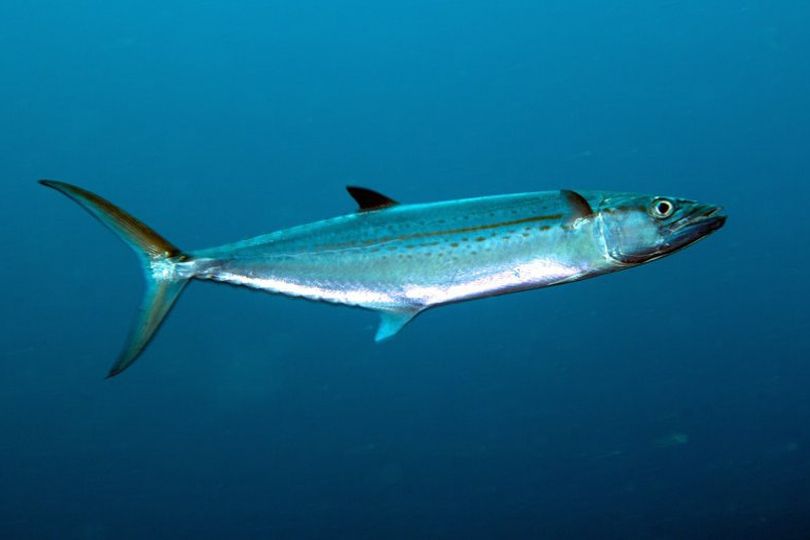
The Cero Fish belongs to the Scombridae family. The maximum size known for the Cero fish is 83 cm and a maximum weight of 7.8 kg and its usual size is about 38 cm. It can live to be 11 years old. It reproduces from April to October in general. It is abundant from October to December. The cero fish has an elongated and streamlined body which is well suited for swimming at speeds of up to 48 km/ h. The body is covered with small scales; the lateral line being inclined towards the caudal peduncle. The caudal fin is lunar and the pelvic fins are relatively long. The scales extend over the pectoral fins. The spiny and soft dorsal fins are separated, with the soft dorsal fin corresponding to the anal fin just below. A series of pinnules follows each fin and three pins on each side of the caudal peduncle. The swim bladder is absent in the cero fish. The back is iridescent bluish green with silvery sides and belly. A semi-lateral bronze band extends from the pectoral fin to the base of the caudal fin. There are several rows of yellow-orange streaks with yellow spots forming lines above and below the sideband. The front third of the first dorsal fin is bluish black.
The Cero fish is a famous fish you can catch in Lynn.The Warsaw Grouper
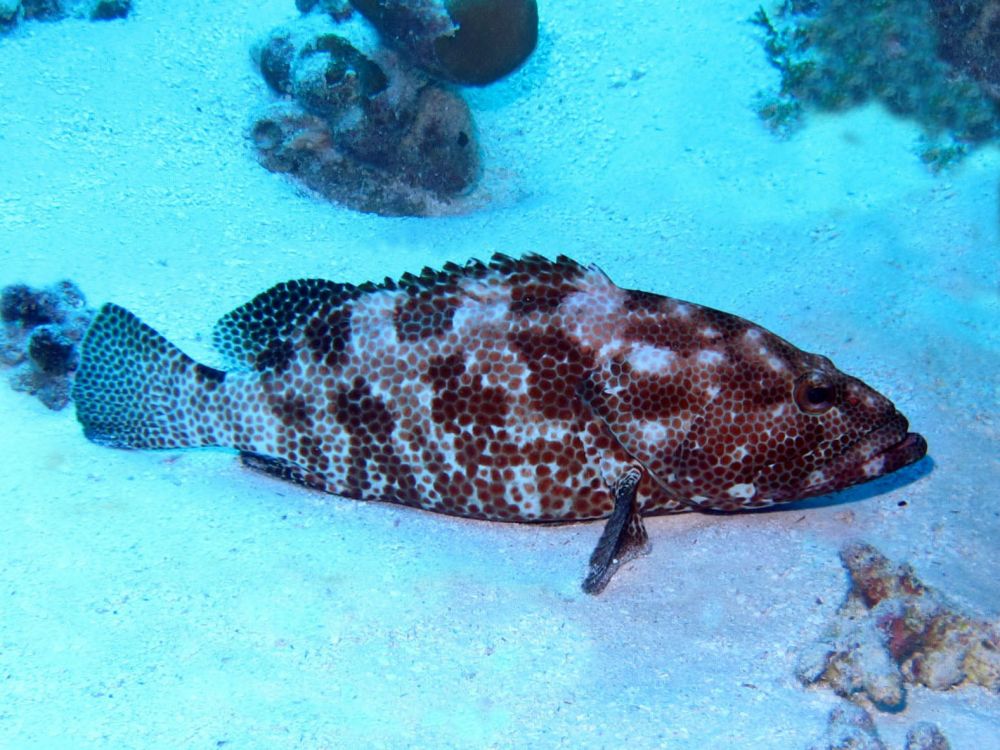
The Warsaw Grouper belongs to the Serranidae family. It can reach a maximum length of 226 cm for 263 kg. It can live for more than 30 years. They lay eggs from August to September. It can be fished all year round. However, fishing is prohibited all year round in federal waters. The Warsaw grouper is the only member of the genus Epinephelous that has 10 dorsal spines, the second of which is much longer than the third. The color is a greyish brown to dark reddish brown background with many small irregular white spots on the sides. The color appears much lighter around the neck and along the posterior edge of the lid. All fins are dark brown, except for the white spiny part of the dorsal fin. The young are characterized by a yellow caudal fin; dark stool on the caudal peduncle; and some whitish spots on the body.
The Warsaw Grouper is a famous fish you can catch in Lynn.The Sheepshead
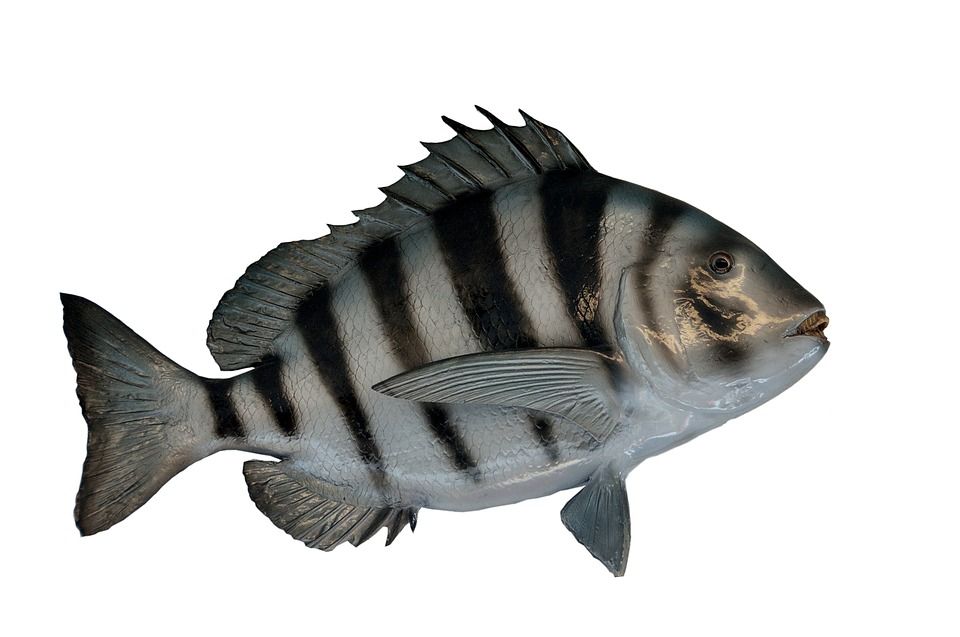
The Sheepshead belongs to the Sparidae family. Although it reaches a maximum size of about 76 cm and 22 lbs (9.6 kg), the adult sheepshead is most often about 5 to 3.6 kg and 35 cm long. The maximum known life span of the sheepshead is at least 20 years. They spawn in early spring. They can be fished all year round with the best season from December to April. The sheepshead has a deep oval body with a blunt snout and a small, almost horizontal mouth. The posterior nostril is split in appearance. The dorsal and anal fins include short, strong spines. The second spine of the anal fin is larger. The pectoral fins are long and extend beyond the anal opening when pressed (close to the body). The caudal fin is slightly forked. The adult sheepshead is silvery to greenish-yellow and has an olive back. There are five or six dark vertical crossbars on each side, which are the most distinct in young individuals. The caudal and pectoral fins are greenish, while the dorsal, anal and ventral fins are dark or black.
The Sheepshead is a famous fish you can catch in Lynn.The Schoolmaster fish
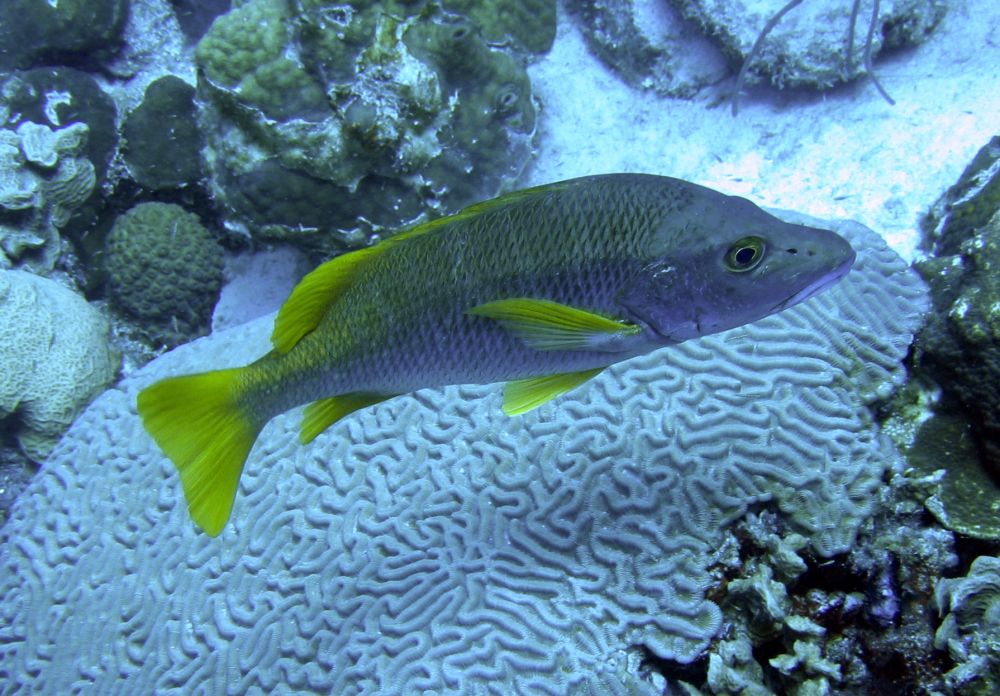
The Schoolmaster fish belongs to the Lutjanidae fish. They reach a maximum of 61 cm long and 3.6 kg in weight, but are normally in the 30 cm to 35 cm range. It has a lifespan of 19 years. Its spawning and fishing season depends on the location. Schoolmaster have a robust, slightly compressed body, moderately deep, with a pointed head. The greatest depth is more than a third of its standard length. The head is broad, as long as the depth of the body; the profile is straight from the muzzle to the nape of the neck, then regularly arched to the tail. Their triangular snout is long and pointed, with a large mouth. The notch and the pre-seal button are small. One of the upper pairs of canines is significantly larger than the anterior teeth of the lower jaw, visible when the mouth is closed. Vomer and the palatins both have teeth. There are no teeth on ectopterygoids. In addition to an anchor-shaped dental patch on the vomer with a median posterior extension, 5 to 7 gills at the first plantar arch of the upper limb and 11 to 15 lower limbs, totalling 17 to 22. The color is olive grey to brownish on the back and upper sides, with a yellow to reddish tinge around the head. The lower sides and belly are lighter; no dark lateral spots under the front of the soft dorsal fin. There are 8 narrow, pale vertical bars on the side of the body that may be pale or absent in large adults. A solid or broken blue line extends over the head under the eyes and may disappear with growth. From the up
The Schoolmaster fish is a famous fish you can catch in Lynn.The Silk Snapper
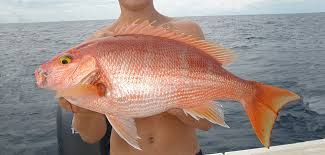
The Silk Snapper belongs to the Lutjanidae family. It can reach a maximum of 83 cm in length and 8.3 kg in weight. They can live up to 30 years. The spawning season can last all year round. The fishing season for silk snapper is from late spring to summer. Silk snappers have an elongated compressed bodies. They are generally red to pinkish red and lighter on the belly. Some fish have thin undulating yellow lines on their sides. A key to identification is the iris of their eyes, which is bright yellow. Their fins are reddish, with yellow reflections on the anal and dorsal fins. Their caudal fin has a dark border and their pectoral fins reach the anus and are pale yellow. Juveniles have black or dark red spots on their upper sides, just below the front edge of their dorsal fin. They have a large mouth equipped with one or more rows of pointed conical teeth on both jaws. Their canines are much larger on the upper jaw. They have an anchor-shaped tooth patch, with a rear extension, on the roof of their mouth and a pair of dental patches on the sides of the roof of their mouth. They have sawtooth caps. Their anal fins have pointed tips, 3 spines and 7 or 8 rays; their caudal fin is lunar; their dorsal fin is continuous with 10 or 11 spines and 13 or 14 rays. They have 16 or 17 lower branches. Their bodies are covered with rough scales and the rows of ladders on their backs are oblique above the lateral line.
The Silk Snapper is a famous fish you can catch in Lynn.Our fishing forecast of Lynn indicates the best time to go fishing in this city.
Our fishing forecast of Lynn indicates the best time to go fishing in this city.
Our fishing forecast of Lynn indicates the best time to go fishing in this city.
